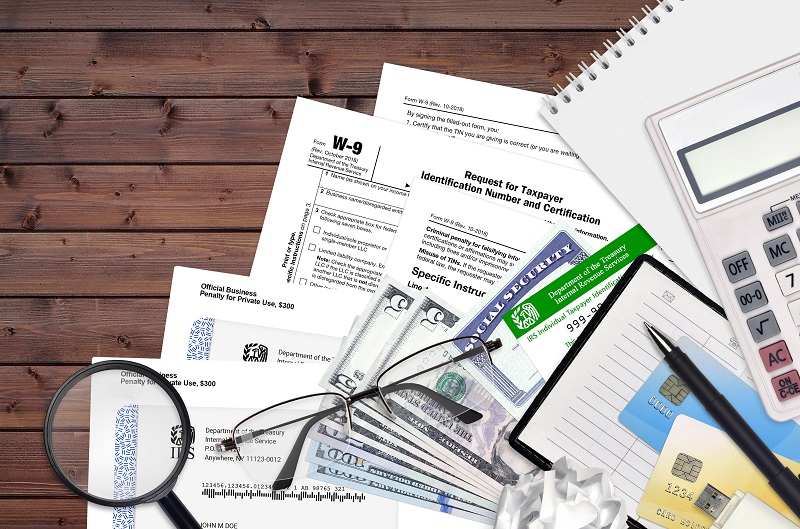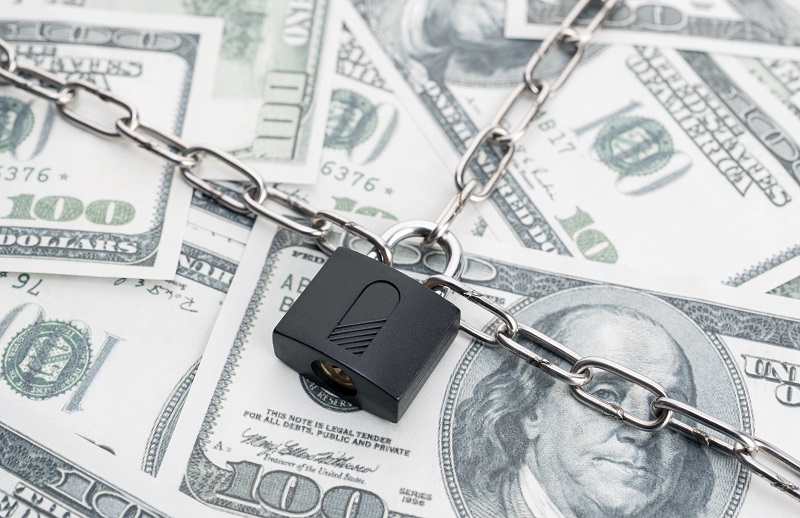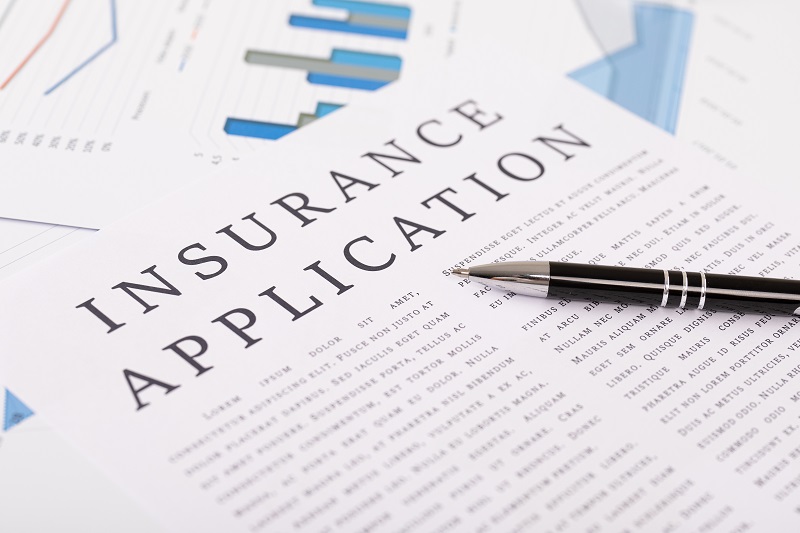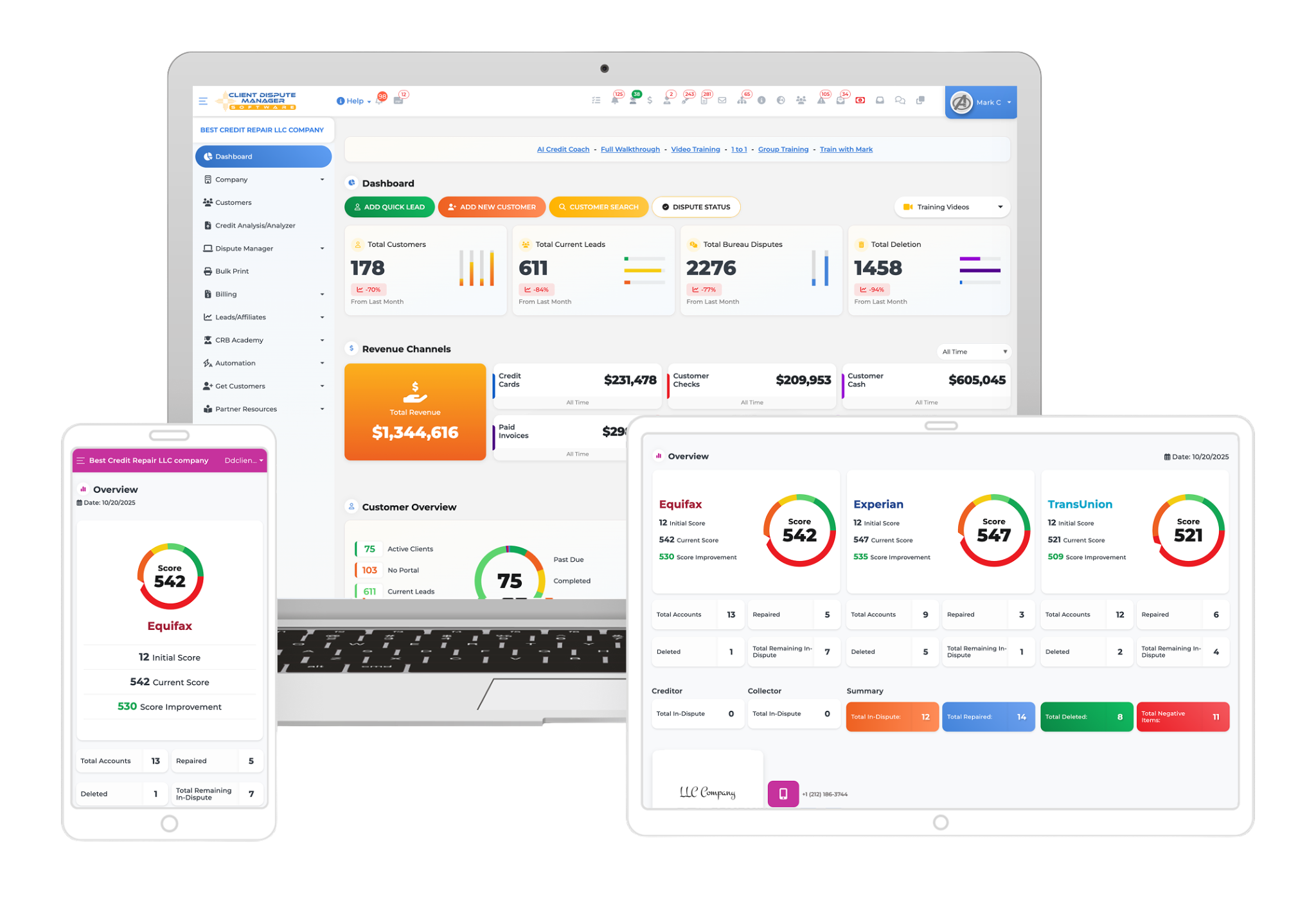If you’re thinking of starting a credit repair business in Maine, it’s important to know the laws and regulations that govern the industry. In this article, we’ll break down the key legal requirements you need to be aware of to launch and operate a successful credit repair business in Maine.
Choose A Business Name and Structure

Select a name for your credit repair business and decide on the legal structure (e.g., sole proprietorship, partnership, LLC, or corporation). Make sure to register your business with the Maine Secretary of State.
- Choose a Business Name: When selecting a name for your credit repair business, make sure it’s unique, easy to remember, and clearly communicates the services you provide. To verify that the name is available, you can conduct a name search on the Maine Secretary of State’s website.
- Register a Business Name: Once you have selected a name, you need to register it with the Maine Secretary of State. If you plan to operate your business under a name different from the legal name, you’ll need to file a “Doing Business As” (DBA) or “Assumed Name” registration.
- Choose a Business Structure: You’ll need to decide on the legal structure of your business. Each structure has different benefits and drawbacks in terms of liability, taxation, and management.
Some common structures for a credit repair business in Maine include:
- Sole Proprietorship: This is the simplest structure and involves one individual who owns and operates the business. You have complete control, but you’re also personally responsible for all debts and liabilities.
- Partnership: Two or more individuals share ownership, responsibility, and liability. There are general partnerships and limited partnerships, each with different levels of liability protection.
- Limited Liability Company (LLC): An LLC combines the liability protection of a corporation with the tax advantages of a partnership. It’s a popular choice for small businesses, as it offers flexibility in management and avoids double taxation.
- Corporation: A corporation is a separate legal entity from its owners, offering the strongest liability protection. However, it’s subject to double taxation, as both the corporation and its shareholders are taxed on profits.
Obtain an EIN

Apply for an Employer Identification Number (EIN) from the IRS. This will be needed for tax purposes and to open a business bank account.
- Online: The easiest and quickest way to obtain an EIN is through the IRS’s online application process. Visit the IRS website and follow the instructions. The online application is available Monday through Friday, 7 a.m. to 10 p.m. Eastern Time. Once you complete the application, you’ll receive your EIN immediately.
- Fax: Complete Form SS-4, the Application for Employer Identification Number, which can be found on the IRS website. Fax the completed form to (855) 641-6935. The IRS will process your application and typically send your EIN within four business days.
- Mail: You can also mail the completed Form SS-4 to the IRS. Send the form to the following address: Internal Revenue Service Attn: EIN Operation Cincinnati, OH 45999. Mailed applications can take up to four weeks to process.
- Telephone (International Applicants Only): If you’re an international applicant without a U.S. principal business location or residence, you can apply for an EIN by phone. Call the IRS at (267) 941-1099 (not a toll-free number) Monday through Friday, 6 a.m. to 11 p.m. Eastern Time.
Register Your Credit Repair Business

Register your credit repair business in Maine, you’ll primarily work with the Maine Secretary of State. Depending on your chosen business structure, the registration process may vary.
Here’s a summary of the steps:
- Business Name and Structure: Choose a unique business name and decide on the legal structure (e.g., sole proprietorship, partnership, LLC, or corporation).
- Business Name Search: Conduct a name search on the Maine Secretary of State’s website to verify the availability of your chosen name.
- Business Name Registration: If you plan to operate under a different name than the legal name, file a “Doing Business As” (DBA) or “Assumed Name” registration with the Maine Secretary of State.
- Register Your Business Structure: Register your chosen business structure with the Maine Secretary of State. The registration process varies depending on the structure. For example, an LLC requires filing Articles of Organization, while a corporation requires filing Articles of Incorporation.
You can access the necessary forms and online filing services on the Maine Secretary of State’s website.
Surety Bond

A surety bond is a legally binding contract involving three parties: the principal (the party required to obtain the bond), the oblige (the party requiring the bond, often a government agency), and the surety (the party issuing the bond, typically an insurance company). The bond guarantees that the principal will fulfill their contractual obligations, adhere to specific regulations, or pay required taxes or fees.
In Maine, Credit Services Organizations fall under the title of Loan Broker. The Maine Loan Broker Bond is required by the Bureau of Consumer Credit Protection of the State of Maine. The required bond amount is $25,000.
Obtain Necessary Licenses and Permits

While Maine does not have specific licensing requirements for credit repair businesses, you may need to obtain a general business license from your city or county. Check with your local government for any additional permits or licenses that might be required.
- General Business License: Check with your local city or county government office to determine if a general business license is required for your credit repair business. This license typically allows you to operate your business within the local jurisdiction.
- Home-based Business Permit: If you plan to operate your credit repair business from home, you may need to obtain a home-based business permit. Contact your local zoning or planning department to determine if your residential area allows for home-based businesses and if any specific permits are required.
- Occupational Licenses: While credit repair services do not typically require a specific occupational license in Maine, it’s essential to verify this information with your local government and the Maine Department of Professional and Financial Regulation.
- Sales and Use Tax License: Register with the Maine Revenue Services to determine if a Sales and Use Tax License is necessary for your specific services. While credit repair services are generally not subject to sales tax in Maine, it’s important to verify this information.
Familiarize Yourself With State And Federal Regulations

Credit repair businesses must comply with the Credit Repair Organizations Act (CROA) and the Fair Credit Reporting Act (FCRA) on the federal level. Additionally, Maine has its own set of consumer protection laws you should be familiar with, such as the Maine Unfair Trade Practices Act.
Federal Regulations:
1. Credit Repair Organizations Act (CROA):
The CROA is a federal law that regulates credit repair businesses to protect consumers from deceptive practices. Key provisions include:
- Prohibiting credit repair companies from making false or misleading claims about their services.
- Requiring credit repair companies to provide a written contract detailing the terms and conditions of the services provided.
- Giving consumers the right to cancel the contract within three days without incurring any charges.
- Prohibiting upfront fees; credit repair companies can only charge fees once the promised services have been rendered.
2. Fair Credit Reporting Act (FCRA):
The FCRA governs the collection, dissemination, and use of consumer credit information. Credit repair businesses must abide by the FCRA’s requirements, such as:
- Ensuring the accuracy of credit information reported to credit bureaus.
- Allowing consumers to dispute incorrect information on their credit reports.
- Notifying consumers of their rights under the FCRA.
State Regulations:
1. Maine Unfair Trade Practices Act:
While not specific to credit repair businesses, the Maine Unfair Trade Practices Act prohibits businesses from engaging in deceptive practices, false advertising, or any other form of unfair competition. Credit repair businesses must operate transparently, honestly, and in compliance with this act.
2. Maine Consumer Protection Laws:
Maine has various consumer protection laws that apply to businesses in general. These laws protect consumers from fraud, deception, and unfair business practices. Credit repair businesses must adhere to these laws when providing services to consumers in Maine.
Create A Business Plan

Develop a detailed business plan outlining your credit repair services, target market, marketing strategy, and financial projections.
- Executive Summary: Provide a brief overview of your credit repair business, including the company’s mission, vision, target market, and competitive advantage.
- Company Description: Describe your credit repair business in detail, including the legal structure, ownership, location, and history (if applicable). Explain the specific credit repair services you’ll offer and how they address the needs of your target market.
- Market Analysis: Research the credit repair industry and your local market to understand the demand for your services. Identify your target audience and outline their demographics, needs, and challenges. Analyze your competition and determine your business’s unique selling points.
- Marketing and Sales Strategies: Develop marketing strategies to reach your target audience and promote your credit repair services. This could include online advertising, social media marketing, content marketing, referrals, or partnerships with related businesses. Outline your sales process, from lead generation to closing, and describe any customer retention strategies.
- Operations and Management: Detail the day-to-day operations of your credit repair business, including staffing, office space, equipment, technology, and any necessary licenses or permits. Describe the roles and responsibilities of your management team and other key personnel.
- Legal and Compliance: Explain how your credit repair business will comply with federal and state regulations, such as the Credit Repair Organizations Act (CROA) and the Fair Credit Reporting Act (FCRA). Discuss any local licenses or permits required for your business.
- Financial Projections: Provide a financial forecast for your credit repair business, including projected revenue, expenses, and profits. Include a break-even analysis, cash flow projections, and balance sheet. Use conservative estimates and support your projections with market research and industry benchmarks.
- Funding Request (if applicable): If you’re seeking external funding, describe the amount needed, how it will be used, and the expected return on investment. Include details on the type of funding you’re seeking (e.g., loans, grants, or equity investment) and any proposed repayment terms.
- Appendix (optional): Attach any relevant documents or supporting materials, such as market research, financial statements, legal documents, or marketing materials.
Establish A Professional Website and Marketing Materials

Create a professional website and marketing materials to showcase your services and attract clients.
1. Choose a Domain Name:
Select a domain name that reflects your credit repair business’s name and is easy to remember. Use a reputable domain registrar to purchase and register the domain name.
2. Select A Website Platform
Choose a website builder or content management system (CMS) that best suits your needs and budget, such as WordPress, Wix, or Squarespace. These platforms offer customizable templates and features to help you create a professional-looking website without extensive web development knowledge.
3. Design Your Website:
Design your website to be user-friendly, visually appealing, and easy to navigate. Make sure it is mobile-responsive, as many users access websites from their smartphones or tablets.
4. Create Engaging Content:
Develop content that clearly explains your credit repair services, the benefits of working with your business, and your unique selling points. Include a clear call-to-action (CTA) on each page, guiding visitors towards taking the desired action, such as contacting you or signing up for a free consultation.
5. Include Essential Pages:
Your website should have the following pages:
- Homepage: Provide an overview of your credit repair services and the value you offer to clients.
- Services: Detail your credit repair services and the process clients can expect when working with you.
- About: Share your company’s background, mission, and team members’ qualifications.
- Testimonials: Showcase client success stories and positive reviews to build trust and credibility.
- Contact: Include your contact information and a contact form for visitors to easily get in touch with you.
- Blog (optional): Share industry news, tips, and insights to establish your expertise and improve your website’s search engine optimization (SEO).
6. Follow Legal Requirements:
Ensure your website complies with state and federal regulations, such as the Credit Repair Organizations Act (CROA) and the Fair Credit Reporting Act (FCRA). Include a clear privacy policy, terms of service, and any required disclosures.
7. Optimize for SEO:
Optimize your website for search engines to improve its visibility and attract more potential clients. This includes using relevant keywords, creating high-quality content, and building backlinks from reputable websites.
8. Create Marketing Materials:
Develop professional marketing materials that reflect your brand, such as business cards, brochures, and social media graphics. Ensure these materials comply with relevant regulations and provide clear, accurate information about your credit repair services.
9. Promote Your Business:
Utilize various marketing channels to promote your credit repair business, such as social media, email marketing, content marketing, and local advertising. Track the performance of your marketing efforts to optimize your strategies and improve your return on investment.
Obtain Business Insurance

Consider obtaining business insurance, such as general liability and errors & omissions insurance, to protect your business from potential claims and lawsuits.
1. General Liability Insurance:
This insurance provides coverage for bodily injury, property damage, and personal injury claims that may arise during the course of your business operations. General liability insurance is essential for most businesses, including credit repair companies, to protect against potential lawsuits or financial losses.
2. Professional Liability Insurance (Errors & Omissions):
This insurance protects your credit repair business against claims of negligence, errors, or omissions in the services provided to your clients. As a credit repair professional, this coverage can help safeguard your business from the financial impact of such claims.
3. Commercial Property Insurance:
If you operate your credit repair business from a physical location, commercial property insurance can protect your office space, equipment, and other property from damage due to events like fire, theft, or natural disasters.
4. Workers' Compensation Insurance:
If you have employees, Maine requires you to carry workers’ compensation insurance. This coverage provides medical benefits and wage replacement for employees who suffer work-related injuries or illnesses.
5. Cyber Liability Insurance:
As a credit repair business, you may handle sensitive client information, making you a target for cyberattacks. Cyber liability insurance can protect your business from the financial impact of data breaches, cyber-attacks, or other technology-related incidents.
6. Business Owner's Policy (BOP):
A BOP combines general liability insurance, commercial property insurance, and often business interruption insurance into a single policy. This type of policy may be a cost-effective option for small businesses, such as credit repair companies, looking for comprehensive coverage.
Open A Business Bank Account

Open a separate bank account for your credit repair business to keep your personal and business finances separate.
1. Choose A Bank:
Research local and national banks that operate in Maine and offer business banking services. Consider factors such as fees, minimum balance requirements, accessibility, customer service, and the range of financial products and services available.
2. Select An Account Type:
Banks typically offer various types of business accounts, such as checking accounts, savings accounts, and merchant services accounts. Determine which type of account best meets your credit repair business’s needs and financial goals.
3. Gather Necessary Documentation:
To open a business bank account, you’ll need to provide specific documentation, which may include:
- Business Registration Documents: Articles of Organization for an LLC or Articles of Incorporation for a corporation, filed with the Maine Secretary of State.
- Employer Identification Number (EIN): A federal tax ID number issued by the IRS, which is required for most business structures.
- Business License or Permits (if applicable): Any required local or state licenses or permits for your credit repair business.
- Operating Agreement or Bylaws (if applicable): These documents outline the governance and management structure of your business.
- Personal Identification: A valid government-issued ID, such as a driver’s license or passport, for the account signatories.
- Social Security Number (SSN) or Individual Taxpayer Identification Number (ITIN) of the account signatories.
4. Visit The Bank:
It’s often best to visit a local branch of your chosen bank in person to open your business bank account. You can speak with a bank representative who can guide you through the account opening process and answer any questions you may have.
5. Complete The Application:
Fill out the bank’s application form, providing all the necessary information and documentation. The bank representative can help you complete the application and ensure everything is in order.
6. Deposit Funds:
Most banks require an initial deposit to open a business bank account. Be prepared to deposit the minimum required amount when you submit your application.
7. Review And Sign:
Once your application is complete, review the account terms and conditions, and sign the agreement to open your account.
Network and Market Your Business

Join local business organizations, attend networking events, and use social media and other online platforms to promote your credit repair services.
1. Develop a Strong Online Presence:
- Create a professional website that showcases your services, offers valuable information, and includes clear calls-to-action.
- Use social media platforms like Facebook, LinkedIn, Twitter, and Instagram to engage with potential clients, share helpful tips, and promote your services.
- Optimize your website for search engines (SEO) to improve its visibility and attract more potential clients.
- Create valuable content, such as blog posts, articles, videos, or webinars, to establish your expertise and attract clients.
2. Participate In Local Networking Events:
- Attend local business networking events, chamber of commerce meetings, or industry-specific events to build relationships with other professionals and potential clients.
- Join local business organizations and associations related to your industry to expand your network and gain access to resources and events.
- Host seminars, workshops, or webinars on credit repair topics to educate the public and showcase your expertise.
3. Partner With Related Businesses:
- Establish relationships with professionals in related industries, such as real estate agents, mortgage brokers, financial planners, or accountants, who may refer clients to your credit repair business.
- Offer referral incentives to partners or clients who refer new customers to your credit repair business.
4. Use Traditional Marketing Methods:
- Advertise your credit repair business in local newspapers, magazines, or online directories.
- Create and distribute promotional materials such as brochures, flyers, or business cards.
- Attend community events and sponsor local causes or organizations to increase your visibility and build goodwill.
5. Leverage Client Testimonials and Referrals:
- Encourage satisfied clients to provide testimonials or reviews on your website or social media platforms.
- Offer incentives for clients to refer friends, family, or colleagues to your credit repair business.
6. Be Active in Your Community:
- Participate in community events, volunteer, or sponsor local organizations to build your reputation and visibility in the community.
- Offer free credit repair consultations, workshops, or seminars to educate the community and generate interest in your services.
Ready to start your credit repair business in Maine?
Make sure you are informed and compliant with the latest state laws.
Click now to learn more.
The laws and regulations governing credit repair businesses in Maine are designed to protect consumers and promote transparency in the industry. By following these requirements, you can demonstrate your commitment to ethical business practices and gain the trust of your clients.
Bonus: Now that you have read this article, why not take your new skill and start your own credit business helping others? We have free training that can help you do just that.


